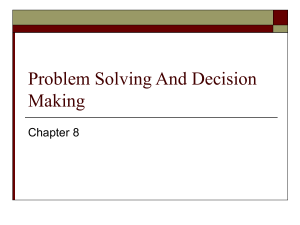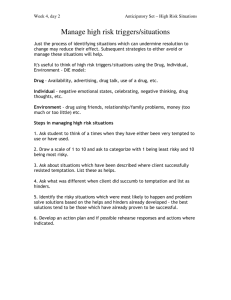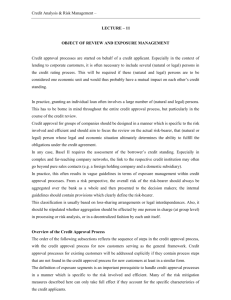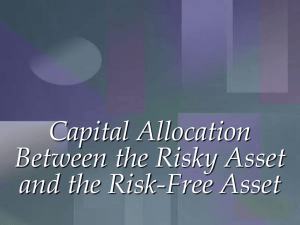risks
advertisement
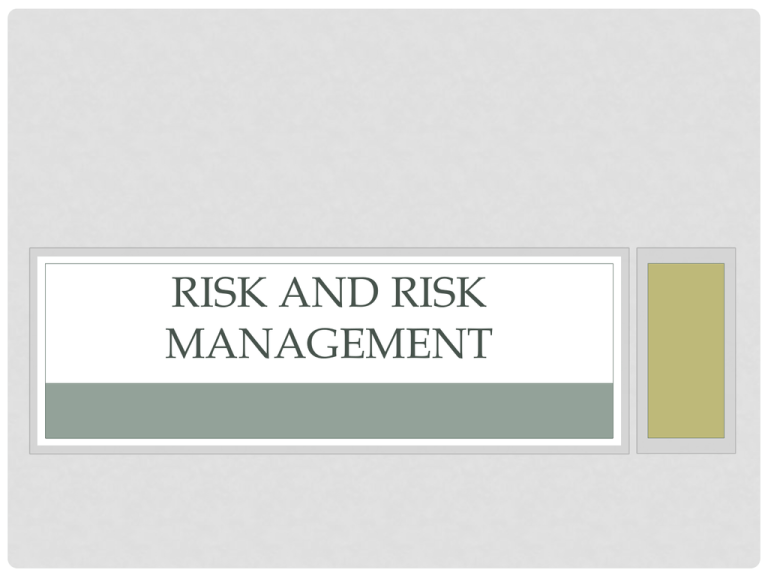
RISK AND RISK MANAGEMENT LESSON OBJECTIVES • Display understanding of typical risks businesses face • Evaluate approaches to risk management and mitigation KEY VOCABULARY TERMS • Asset • Business interruption insurance • Diversification • Employee Confidentiality Agreement • Fire Insurance • General Liability Insurance • Insurance • Malpractice • Mitigate • Premiums • Product Liability Insurance • Product Testing • Pure Risk • Quality Assurance KEY VOCABULARY TERMS • Risk • Risk Mitigation • Speculative Risk • Strategic Partnership • Surety Bond • Theft insurance • Vehicle insurance • Worker’s compensation • Worker’s compensation insurance WHAT’S THE RISK? • Every business faces a certain amount of risk. • Some risks can be controlled and prevented, while other risks are unpredictable and uncontrollable • What types of risks would a fast food restaurant face? • Unpredictable risks • Preventable risks WHAT’S THE RISK • All businesses are financial entities that have assets—property, equipment, money in the bank, intellectual property, and people that are things the business values. • Unfortunately, these valuable things constantly face risks from the real world. These risks take the form of accidents, disasters, market downturns, and other unforeseen events. These dangers must be protected against. • Companies often purchase insurance or pursue specific strategies to reduce their level of risk. UNDERSTANDING RISKY BUSINESS • Download- Reading: Risky Business • Download- Worksheet: SQ3R • Fill out while reading MITIGATING RISKY BUSINESS PART 1 • Download- Team Activity: Risky Business • Imagine that you are risk mitigation consultants hired by ECPak to suggest a package of strategies and insurance policies to reduce the company’s overall risk MITIGATING RISKY BUSINESS PART 1 • Analyze the cost per year and potential benefit of the type of risk mitigation that is being offered • There is a budget involved, so start with the most necessary types of insurance and then see how much money they have left before purchasing “nice-to-have” insurance • In most states certain types of insurance such as workers’ compensation are mandatory, find the required insurance under NJ law for this assignment MITIGATING RISKY BUSINESS PART 1 • How many groups had trouble staying within the financial constraints of the ECPak Company? • Out of all of the choices listed on the Mitigation Menu, which one seems to be the most important? Why? RISKY BUSINESS PART 2 • My basket contains cards representing unfortunate events that could happen to ECPak. • Use the card to calculate the overall cost of and savings from their risk mitigation plan. RISKY BUSINESS PART 2 • How did groups choose which options to pick? What was their reasoning? • What are the tradeoffs in the area of risk mitigation? RISKY BUSINESS PART 2 • Tradeoffs are made by businesses every day—and because losses are unpredictable, they have to be very careful when selecting types of insurance, using the knowledge that they have available • A business located in a flood plain, for example, would take their location into account when determining whether flood insurance is necessary REVIEW • List and define the risks associated with running a business • List and describe the types of insurance available to the business • How can business mitigate risk outside of insurance? • What are the most important types of insurance a business can have? CLOSURE • The most important thing a business owner should remember when thinking about ways to minimize the risks involved with business ownership • In your opinion, what is the one thing a business owner should always remember when thinking about ways to minimize risk? ENRICHMENT • Research different risk mitigation companies and present information about the company to the class. ENRICHMENT • Research pure risk and speculative risk and write a brief essay describing why speculative risk is not insurable. ENRICHMENT • Create a poster describing different types of risk and how to avoid it.
